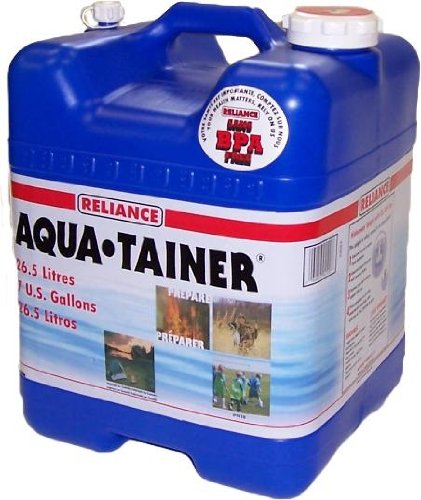If you are fortunate enough to have a well or some other stable, reliable source of off-grid water, you probably can stop reading. Or should you? When it comes to storing water for emergencies or a SHTF situation, nobody can be certain of the reliability or safety of their water supply. While humans can go a long time with little or no food, the same cannot be said for water, and that is why an emergency store of water is one of the most important supplies you can have on hand.
But how do you store water for the long term? How much should you store? And how do you keep it sanitary and clean? These are all important questions with fortunately very simple answers, that will set you down the path of full self-sufficiency in the event of a grid-down emergency.
How Much Water Should I Store?
A general rule is one gallon per person per day. When I lived off grid on my sailboat, that was a common one, that allowed half a gallon for drinking and half a gallon for minimal basic sanitation. A better option was two gallons per day, which allowed for more cleaning and drinking water.
However, this general rule probably is almost useless as a real-world guide. The temperature, your physical health, size, diet, and other factors all determine how much water you need to have on hand for sanitation and drinking. And don’t forget your pets and other animals while you are at it!
I’m not going to tell you a magic amount of water per day to store per person. The best way to figure that out is to carefully measure the amount of water you use for drinking and cooking each day, average it out, and add a bit extra as a margin of error. Allow for the fact that in hotter weather you may need a gallon or more just for drinking. If you are relying on freeze dried foods in your preps, allow extra water just for preparing your food.
Sanitation allows for the bare minimum of washing hands and other important parts of your body. It does not allow for showers or toilet flushing. However, you can flush toilets with non-potable water, or in an emergency use an outdoor latrine.
The bottom line is the amount of water you need per day at a minimum depends on you and you alone. Once you’ve figured out that daily amount, then it’s time to start storing.
 Reliance Products Aqua...
Buy New $14.97
(as of 10:54 UTC - Details)
Reliance Products Aqua...
Buy New $14.97
(as of 10:54 UTC - Details)
A minimum of three days stored water is a good idea but presumes an ideal circumstance where emergency response crews can restore utilities, or start distributing stores of water. A week is good, two weeks is better, a month is fantastic, more than it is amazing. How much you store depends on how much space you have to store it in. Try for at least a week though, it gives a better margin in an emergency.
How Do I Store Water?
The simplest way is to simply buy commercially bottled gallon jugs and cases of bottled water. While more expensive, it gives you a pure product in sealed containers that can easily fit in closets, under beds, or in other handy locations. Just choose a cool, dry place and avoid excessive heat or cold, and you are done!
Another option which I like is to buy 
You can also go hardcore and opt for 

There may be other options, like repurposing marine or RV water tanks for stationary storage, but for the most part, these three primary choices are the well-equipped prepper’s best choices. Personally, I’d opt for the 7-gallon jugs, but that’s because they best suit my personal uses. I mix them up with a couple of cases of bottled water and a couple of one-gallon jugs and feel quite secure with my emergency water supply.





